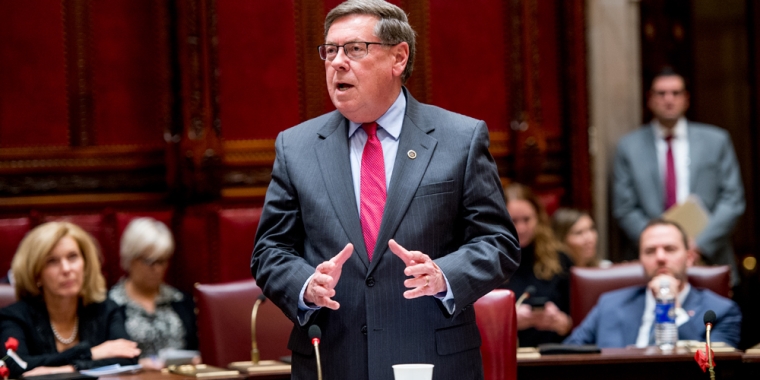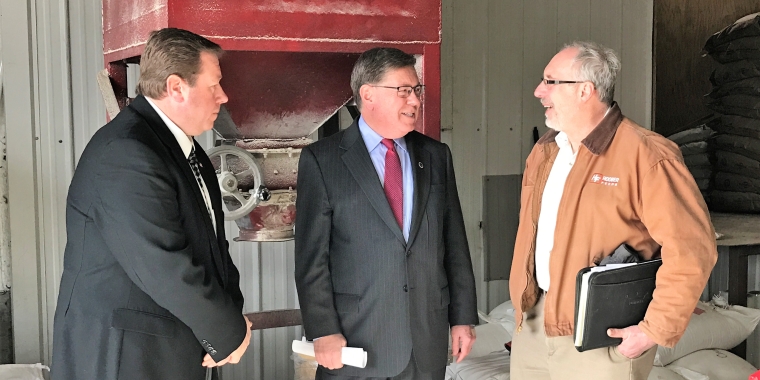
Clothing Sales Tax Exemption - Saving Families Money
James L. Seward
October 18, 2012

ONEONTA, 10/18/12 - State Senator James L. Seward (R/C/I-Oneonta) today reminded shoppers they no longer pay state sales tax on clothing and footwear purchases up to $110.
"Clothing purchases can be a big part of a family budget, and I was pleased to support this tax cut to help hardworking New Yorkers keep more money in their pockets. Repealing the state sales tax on clothing is projected to save a typical family of four nearly $200 a year," said Senator Seward.
All clothing and footwear sold for less than $110 per item (or per pair of footwear) are now exempt from the New York State 4 percent sales tax. Additionally, most fabric, thread, yarn, buttons, snaps, hooks, zippers and similar items that are used to make or repair exempt clothing are also be eligible for the exemption. In this economy, where many family budgets are stretched to the breaking point, every dollar counts. Below you will find additional information about this exemption.
For more infomrmation, along with a list of counties that have dropped their local portion of the clothing sales tax , visit the Tax Department website.
INFORMATION REGARDING THE ELIMINATION OF THE STATE SALES TAX ON CLOTHING & FOOTWEAR PURCHASES UP TO $110
Orders for clothing and footwear
Merchandise that is ordered by mail, telephone, the Internet, or e-mail is taxed at the rate in effect on the date the order is accepted by the vendor, regardless of when the order will be delivered. An order is accepted by the vendor when the vendor has taken an action to fill the order. Actions to fill an order include placing an in-date stamp on a mail order or assigning an order number to an order. Accordingly, the state and local exemption in effect on the date the order is accepted will apply.
Rain checks
Sales tax on any purchase made with a rain check is based on the rate in effect at the time of the purchase, without regard to when the rain check was issued. Accordingly, any state and local exemption in effect at the time of purchase will apply.
Layaway sales
In a layaway sale, merchandise is set aside for future delivery to a customer who makes a deposit and agrees to pay the balance of the purchase price over a period of time before the merchandise is delivered. The sales price of the merchandise includes any additional charges a vendor makes for putting the merchandise on layaway. If a vendor and a customer enter into a contract for a layaway sale of eligible clothing or footwear before April 1, 2012, the state and local exemption in effect at the time the layaway contract is entered into will apply if:
• the customer makes a deposit of at least 10% of the purchase price, and
• the merchandise is segregated from other inventory.
If a vendor and a customer enter into a contract for a layaway sale of eligible clothing or footwear on or after April 1, 2012, the state and local exemption in effect at that time will apply.
Returns and exchanges
If a customer purchases eligible clothing or footwear before April 1, 2012, and pays tax on the purchase, and then returns the item and receives a store credit or is allowed to purchase an exempt item on or after April 1, 2012, the tax paid on the purchase of the initial item can be refunded or credited. This is because the original sale was canceled.
If a customer purchases exempt clothing or footwear, and later returns the item for an exchange, there will be no tax due as long as the item is exchanged for another exempt item. If the customer returns the original item and receives a credit, or is allowed to purchase a different item that is not eligible for the exemption, the applicable sales tax will apply to the sale of the newly-purchased item. For example, if a customer buys a pair of exempt shoes and returns them for store credit, and then uses the credit to purchase an umbrella, tax is due on the full price of the umbrella.
Description of the clothing and footwear exemption
The exemption applies only to clothing and footwear worn by humans. It also applies to most fabric, thread, yarn, buttons, snaps, hooks, zippers, and like items which become a physical component part of exempt clothing or that are used to make or repair exempt clothing. While the exemption applies to items of clothing and footwear worn on the body, not all items worn on the body qualify as clothing or footwear. Jewelry, watches, and like items remain taxable.
Equipment items, such as tool belts, hard hats, and sport, bicycle and motorcycle helmets, though worn on the body, remain taxable. Protective goggles and safety glasses (unless prescription) for sport or occupational use, protective sport or occupational masks or pads, hockey and baseball fielders’ gloves or mitts, ice skates and roller skates, fireplace mittens, and similar pieces of equipment (sporting or otherwise) also remain taxable. Antique clothing and footwear are exempt if they are purchased for human wear and not as collector’s items. All purchases of doll and pet clothes and footwear are taxable.
If exempt clothing or footwear is sold with other taxable merchandise as a single unit, the full price is subject to sales or use tax, unless the price of the clothing or footwear is separately stated. For example, a store has a boxed gift set for sale that has a French-cuff dress shirt, cufflinks and a tie tack. The gift set is sold for a single price of $50. Although the shirt sold by itself would be exempt, the full price of the boxed gift set would be taxable because the cufflinks and tie tack are taxable and the selling price of the shirt is not separately stated.
The following additional limitations will apply to the exemption.
The article of clothing or pair of shoes or other articles of footwear must be sold for less than $110 per article or pair. This less than $110 limitation also applies to each item of fabric, thread, yarn, buttons, snaps, hooks, zippers, and like items which become a physical component part of exempt clothing or that are used to make or repair exempt clothing. A charge by the vendor for alterations to clothing sold by the vendor should be included when determining whether the less than $110 limitation has been met, unless the vendor separately states a reasonable charge for the alteration on the receipt given to the purchaser of the clothing [see TSB-M-02(4)S].
Costumes and rented formal wear are not eligible for exemption. Nor does the exemption apply to fabric, thread, yarn, buttons, snaps, hooks, zippers, and like items which become a physical component part of costumes or rented formal wear or that are used to make or repair costumes or rented formal wear.
Items of fabric, thread, yarn, buttons, snaps, hooks, zippers and like items used to make or repair otherwise exempt clothing are not eligible for exemption if the item is made from real or imitation pearls, or from real or imitation precious or semiprecious stones, jewels, or metals.
Most accessories (such as handbags, umbrellas, watches, and watchbands) are not considered clothing and are taxable. However, belt buckles, handkerchiefs, sweatbands, head scarves, and neckwear, such as scarves and ties, are exempt.
Fabric, thread, yarn, buttons, snaps, hooks, zippers, and like items used to make or repair taxable products are taxable.
Monogramming of clothing prior to its sale is eligible for exemption if the monogramming is sold in conjunction with the sale of the clothing and the price for the monogrammed item is less than $110. However, if the monogramming is done separately by a vendor for a separate charge, the charge for this service is taxable. This limitation also applies to the application of decals, logos and like items (e.g., pictures or letters) by sewing, printing, imprinting, silk screening, and the like.
Delivery, shipping, and handling charges (delivery)
Reasonable, separately stated charges by the vendor for delivery of eligible clothing and footwear are not taken into account in determining if the cost of an item is less than the $110 limitation. For example, if an article of clothing sells for $95 and the vendor charges $20 for delivery, the clothing and the delivery charge qualify for exemption. However, delivery charges by the vendor for items or pairs costing $110 or more remain subject to tax.
Coupons
If a customer uses a manufacturer’s coupon to pay for an article of clothing or a pair of shoes or other articles of footwear, the value of the coupon does not reduce the selling price for purposes of determining whether the article or pair is sold for less than $110. But if a customer pays for clothing or footwear using a store coupon, for which the store receives no reimbursement, the store coupon does reduce the selling price of the clothing or footwear for purposes of determining whether the item is sold for less than $110.
Listing of Exempt and Taxable Items:
Aerobic clothing
Antique clothing (for wear)
Aprons
Arch supports* (unless rented)
Arm warmers
Athletic supporters
Athletic or sport uniforms or clothing (but not equipment such as mitts, helmets and pads)
Bandanas
Bathing caps
Bathing suits
Beach caps and coats
Belt buckles
Belts/suspenders
Bibs (baby)
Blouses
Boots (climbing, fishing, riding, ski, waders)
Bridal gowns and veils (unless rented)
Caps
Coats and wraps
Corset laces
Coveralls
Diapers (adult - including disposable)*
Diapers (children - including disposable)
Dress shields
Dresses
Ear muffs
Formal clothing (unless rented)
Fur clothing
Garters/garter belts
Girdles
Gloves (batting, bicycle, dress [unless rented], garden, golf, ski, tennis, work)
Graduation caps and gowns (unless rented)
Gym suits
Hand muffs
Handkerchiefs
Hats
Hosiery (panty hose, peds, etc.)
Insoles
Jeans
Jogging suits
Lab coats
Leg warmers
Leotards
Lingerie
Pajamas
Ponchos
Prom dress (unless rented)
Rain wear
Receiving blankets
Religious clothing
Rented uniforms (unless formal wear/costume)
Riding pants
Robes
Scarves
Scout uniforms
Shawls and wraps
Shirts
Shoes (ballet, bicycle, bowling, cleated, football, golf, jazz/dance, soccer, track, etc.)
Shoe inserts
Shoe laces
Shoulder pads, for dresses, jackets, etc. (but not athletic or sport protective pads)
Shower caps
Ski masks
Sleepwear
Slippers
Sneakers
Socks
Sports clothing and uniforms (but not equipment such as mitts, helmets and pads)
Stockings
Support hosiery
Suspenders
Sweat bands
Sweat suits
Ties/neckwear
Tights
Tuxedo (unless rented)
UnderwearUniforms (occupational, military, scouting, sport)
Wet and dry suits
Yard goods, and notions*
* Items marked with an asterisk are exempt regardless of their price.
** Yard goods and notions (fabric, thread, yarn, buttons, snaps, hooks, zippers and like items) used or consumed to make or repair exempt clothing which become a physical component part of the clothing are generally exempt.
Share this Article or Press Release
Newsroom
Go to NewsroomSeward Calls for Crackdown on Drug Related Arson
March 8, 2018

Senate Adopts Comprehensive School Safety Package
March 5, 2018

Seward Delivers Infrastructure Improvement Funds to Schoharie County
February 26, 2018

